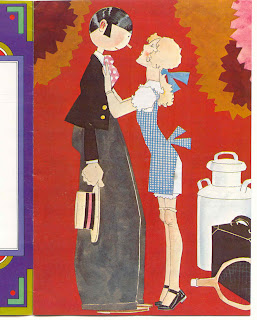- Messages
- 13,566
- Location
- Germany
I'm such a boy. An enjoying "Bohème". A little feminine, with an "aesthetical sensibility".
?
?
Last edited:
So a cake eater is equivalent to a lounge lizard?



A typical cake-eater in action, c. 1926.

*Not* a cake-eater.
My wife used to wear them all the time about 10 years ago, but I think they have gone out of style. She still does have one that she wears for smart casual things though.Today, first time I heared "twinset", on ladies-clothing. Never read it before. A pullover and a same designed cardigan overhead. Seems to be a nice, timeless basic. But I don't know, if I ever saw this on any woman.
 John Lofgren Monkey Boots Shinki Horsebuttt - $1,136 The classic monkey boot silhouette in an incredibly rich Shinki russet horse leather.
John Lofgren Monkey Boots Shinki Horsebuttt - $1,136 The classic monkey boot silhouette in an incredibly rich Shinki russet horse leather.  Grant Stone Diesel Boot Dark Olive Chromexcel - $395 Goodyear welted, Horween Chromexcel, classic good looks.
Grant Stone Diesel Boot Dark Olive Chromexcel - $395 Goodyear welted, Horween Chromexcel, classic good looks.  Schott 568 Vandals Jacket - $1,250 The classic Perfecto motorcycle jacket, in a very special limited-edition Schott double rider style.
Schott 568 Vandals Jacket - $1,250 The classic Perfecto motorcycle jacket, in a very special limited-edition Schott double rider style. For years I've wondered about the origin of a phrase I first ran across in a 1920s recording engineer's log, in which the technician on duty noted that a "power tube went democratic." From the context it was evident that this tube had suffered a catastrophic failure, and I imagined that there had to be some obscure political origin to the phrase, but I couldn't quite pin it down. But today I came across a note in a turn-of-the-century magazine article indicating that the phrase was in common use among African-Americans in the South during the Reconstruction Era -- when the vote "went Democratic," in a time when the Southern Democratic party stood for disenfranchisement and segregation, circumstances went very much against their interests. How a presumably-white technician in New Jersey in 1929 happened to pick up this obscure bit of forty-year-old slang would likely make an interesting story.
For years I've wondered about the origin of a phrase I first ran across in a 1920s recording engineer's log, in which the technician on duty noted that a "power tube went democratic." From the context it was evident that this tube had suffered a catastrophic failure, and I imagined that there had to be some obscure political origin to the phrase, but I couldn't quite pin it down. But today I came across a note in a turn-of-the-century magazine article indicating that the phrase was in common use among African-Americans in the South during the Reconstruction Era -- when the vote "went Democratic," in a time when the Southern Democratic party stood for disenfranchisement and segregation, circumstances went very much against their interests. How a presumably-white technician in New Jersey in 1929 happened to pick up this obscure bit of forty-year-old slang would likely make an interesting story.